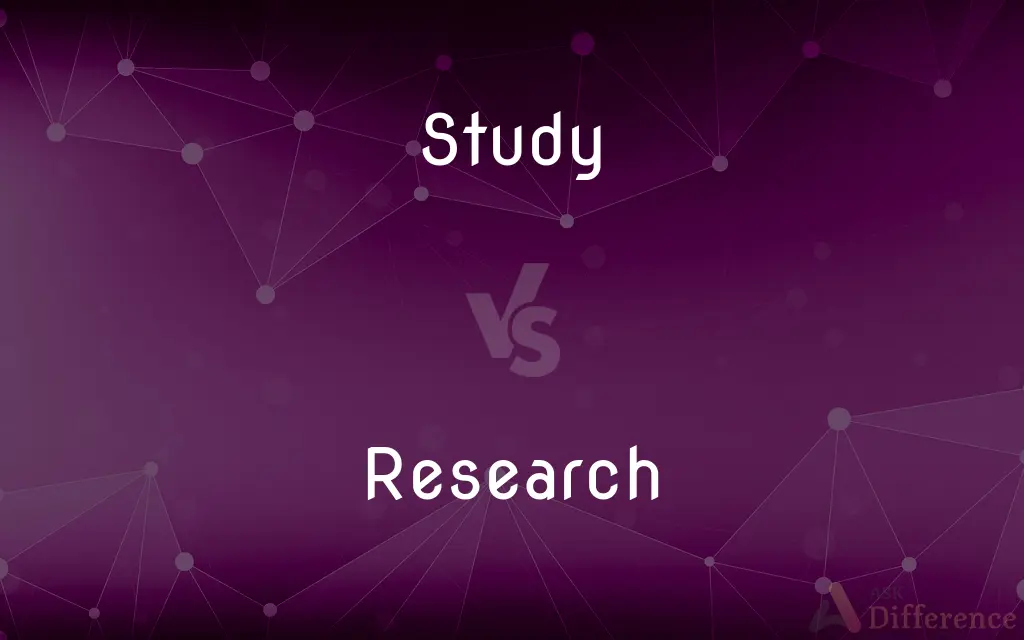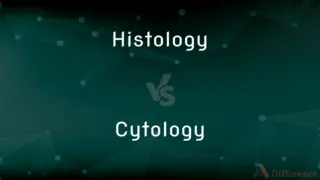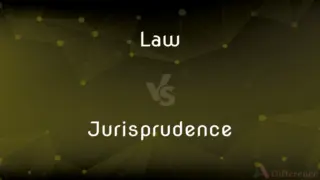Study vs. Research — What's the Difference?
By Tayyaba Rehman & Fiza Rafique — Updated on September 19, 2023
Study involves acquiring knowledge or skills through learning or experience. Research is systematic investigation to establish facts, principles, or generalizable knowledge. Both are inquiry forms, but research typically demands a structured methodology.

Difference Between Study and Research
Table of Contents
ADVERTISEMENT
Key Differences
Study refers to the process of gaining knowledge or understanding through focused learning or examination. Research, on the other hand, involves conducting systematic investigations, often through the collection and analysis of data, to discover new information or establish facts. While both activities aim to increase knowledge, the methods and outcomes often differ.
Studying primarily focuses on the acquisition of existing knowledge. For example, students study textbooks, listen to lectures, or review materials to prepare for exams. Research, conversely, is a more structured and methodical process geared towards contributing new knowledge or understanding to a field. Researchers often use rigorous methodologies to collect, analyze, and interpret data.
Study can be a component within the larger process of research. One might study existing literature, theories, or methods as part of a research project. In contrast, research can involve studying but extends beyond it by incorporating elements like hypothesis testing, data collection, and results interpretation.
In terms of outcomes, studying typically results in personal enrichment, academic achievement, or skill development. Research, however, aims for a broader impact, contributing new insights or discoveries that can be generalized to a larger population or area of study.
In summary, study and research are both means of acquiring knowledge. However, study is often a more flexible, learner-centric activity, whereas research is a structured, systematic process that seeks to add new information or perspectives to an academic or professional field.
ADVERTISEMENT
Comparison Chart
Purpose
Knowledge acquisition
Knowledge creation
Methodology
Flexible, learner-centric
Structured, systematic
Outcome
Personal enrichment
Generalizable results
Scope
Individual or small groups
Often broader population
Involves
Learning, reviewing, practicing
Hypothesis, data collection, etc.
Compare with Definitions
Study
Research involves systematic investigation to discover new information.
Her research in biochemistry led to a groundbreaking discovery.
Research
Research is "creative and systematic work undertaken to increase the stock of knowledge". It involves the collection, organization, and analysis of information to increase understanding of a topic or issue.
Study
Research aims to contribute new knowledge or understanding.
Her research added valuable insights into climate change.
Research
The systematic investigation into and study of materials and sources in order to establish facts and reach new conclusions
He prefaces his study with a useful summary of his own researches
Medical research
The group carries out research in geochemistry
Study
Research usually requires a structured methodology.
He followed a strict methodology during his research.
Research
Investigate systematically
The team have been researching into flora and fauna
She has spent the last five years researching her people's history
Study
Research can be either qualitative or quantitative.
His research included both interviews and statistical analysis.
Research
Careful study of a given subject, field, or problem, undertaken to discover facts or principles.
Study
Research often results in generalizable outcomes.
The research findings were applicable to a larger population.
Research
An act or period of such study
Her researches of medieval parish records.
Study
Study is the act of learning and acquiring knowledge.
She excels in her classes because she knows how to study effectively.
Research
To engage in or perform research.
Study
Study can be both formal and informal learning.
She gained fluency in Spanish through independent study.
Research
To study (something) thoroughly so as to present in a detailed, accurate manner
Researching the effects of acid rain.
Study
Study often aims for personal enrichment or skill development.
His study of philosophy changed his outlook on life.
Research
To do research for
Research a magazine article.
Study
The devotion of time and attention to gaining knowledge of an academic subject, especially by means of books
An application to continue full-time study
The study of English
Research
Diligent inquiry or examination to seek or revise facts, principles, theories, applications, etc.; laborious or continued search after truth.
The research station that houses Wang and his team is outside Lijiang, a city of about 1.2 million people. File:The research station that houses Wang and his team is outside Lijiang.ogg
Study
A detailed investigation and analysis of a subject or situation
The study of global problems
A study of a sample of 5,000 children
Research
A particular instance or piece of research.
Study
A room used or designed for reading, writing, or academic work
The third bedroom was used as a study
Research
(transitive) To search or examine with continued care; to seek diligently.
Study
A piece of work, especially a drawing, done for practice or as an experiment.
Research
(intransitive) To make an extensive investigation into.
Study
A thing or person that is an embodiment or good example of something
He perched on the edge of the bed, a study in confusion and misery
Research
(transitive) To search again.
Study
Devote time and attention to gaining knowledge of (an academic subject), especially by means of books
I studied classics at college
Research
Diligent inquiry or examination in seeking facts or principles; laborious or continued search after truth; as, researches of human wisdom; to research a topic in the library; medical research.
The dearest interests of parties have frequently been staked on the results of the researches of antiquaries.
Study
Look at closely in order to observe or read
She bent her head to study the plans
Research
Systematic observation of phenomena for the purpose of learning new facts or testing the application of theories to known facts; - also called scientific research. This is the research part of the phrase "research and development" (R&D).
Study
Make an effort to achieve (a result) or take into account (a person or their wishes)
With no husband to study, housekeeping is mere play
Research
To search or examine with continued care; to seek diligently.
Study
The effort to acquire knowledge, as by reading, observation, or research
The study of language has overturned many misconceptions.
Research
Systematic investigation to establish facts
Study
An act or effort made in the pursuit of knowledge
Applied himself to his studies.
Research
A search for knowledge;
Their pottery deserves more research than it has received
Study
A branch of knowledge or department of learning
The study of geography.
Graduate studies.
Research
Inquire into
Study
Attentive examination or analysis
The new drug is still under study.
Research
Attempt to find out in a systematically and scientific manner;
The student researched the history of that word
Study
A detailed examination, analysis, or experiment investigating a subject or phenomenon
Conducted a study of children's reading habits.
Study
A document or publication presenting the results of such an endeavor.
Study
A literary work treating a particular subject or character
The novel is a study of Irish childhood.
Study
A preliminary sketch, as for a work of art or literature.
Study
(Medicine) A diagnostic test.
Study
(Music) A composition intended as a technical exercise.
Study
A state of mental absorption
She is in a deep study.
Study
A room intended or equipped for studying or writing.
Study
A noteworthy or interesting example
He is a study in contradictions.
Study
To apply one's mind purposefully to the acquisition of knowledge or understanding of (a subject).
Study
To take (a course) at a school.
Study
To try to memorize
Studied the lines for her role in the play.
Study
To perform a study of; investigate
We need to study the problem further.
Study
To read or look at carefully
Studied the map.
Studied his expression.
Study
To give careful thought to; contemplate
Let's study our next move.
Study
(Medicine) To perform a diagnostic test on (a part of the body, for example).
Study
To apply oneself to learning, especially by reading
Studied for the exam.
Study
To pursue a course of study
Studied at Yale.
Study
To ponder; reflect.
Study
To review materials already learned in order to make sure one does not forget them, usually in preparation for an examination.
Students are expected to start studying for final exams in March.
I need to study my biology notes.
Study
(academic) To take a course or courses on a subject.
I study medicine at the university.
Study
To acquire knowledge on a subject with the intention of applying it in practice.
Biologists study living things.
Study
To look at minutely.
He studied the map in preparation for the hike.
Study
To fix the mind closely upon a subject; to dwell upon anything in thought; to muse; to ponder.
Study
To endeavor diligently; to be zealous.
Study
Mental effort to acquire knowledge or learning.
The study of languages is fascinating.
Study
The act of studying or examining; examination.
I made a careful study of his sister.
Study
Any particular branch of learning that is studied; any object of attentive consideration.
Study
A room in a house intended for reading and writing; traditionally the private room of the male head of household.
Father spends all his time in the study poring over manuscripts.
Study
An artwork made in order to practise or demonstrate a subject or technique.
A study of heads or of hands for a figure picture
Study
The human face, bearing an expression which the observer finds amusingly typical of a particular emotion or state of mind.
Geoffrey's face was a study.
Geoffrey's face was a study in amazement [or in bewilderment, irritation, distress etc.]
Study
(music) A piece for special practice; an étude.
Study
(academic) An academic publication.
That new study on noncommutative symmetries looks promising.
Study
One who commits a theatrical part to memory.
Study
(chess) An endgame problem composed for artistic merit, where one side is to play for a win or for a draw.
Study
(obsolete) A state of mental perplexity or worried thought.
Study
(archaic) Thought, as directed to a specific purpose; one's concern.
My study was to avoid disturbing her.
Study
A setting of the mind or thoughts upon a subject; hence, application of mind to books, arts, or science, or to any subject, for the purpose of acquiring knowledge.
Hammond . . . spent thirteen hours of the day in study.
Study gives strength to the mind; conversation, grace.
Study
Mental occupation; absorbed or thoughtful attention; meditation; contemplation.
Just men they seemed, and all their study bentTo worship God aright, and know his works.
Study
Any particular branch of learning that is studied; any object of attentive consideration.
The Holy Scriptures, especially the New Testament, are her daily study.
The proper study of mankind is man.
Study
A building or apartment devoted to study or to literary work.
Study
A representation or rendering of any object or scene intended, not for exhibition as an original work of art, but for the information, instruction, or assistance of the maker; as, a study of heads or of hands for a figure picture.
Study
A piece for special practice. See Etude.
Study
To fix the mind closely upon a subject; to dwell upon anything in thought; to muse; to ponder.
I found a moral first, and then studied for a fable.
Study
To apply the mind to books or learning.
Study
To endeavor diligently; to be zealous.
Study
To apply the mind to; to read and examine for the purpose of learning and understanding; as, to study law or theology; to study languages.
Study
To consider attentively; to examine closely; as, to study the work of nature.
Study thyself; what rank or what degreeThe wise Creator has ordained for thee.
Study
To form or arrange by previous thought; to con over, as in committing to memory; as, to study a speech.
Study
To make an object of study; to aim at sedulously; to devote one's thoughts to; as, to study the welfare of others; to study variety in composition.
For their heart studieth destruction.
Study
A detailed critical inspection
Study
Applying the mind to learning and understanding a subject (especially by reading);
Mastering a second language requires a lot of work
No schools offer graduate study in interior design
Study
A written document describing the findings of some individual or group;
This accords with the recent study by Hill and Dale
Study
A state of deep mental absorption;
She is in a deep study
Study
A room used for reading and writing and studying;
He knocked lightly on the closed door of the study
Study
A branch of knowledge;
In what discipline is his doctorate?
Teachers should be well trained in their subject
Anthropology is the study of human beings
Study
Preliminary drawing for later elaboration;
He made several studies before starting to paint
Study
Attentive consideration and meditation;
After much cogitation he rejected the offer
Study
Someone who memorizes quickly and easily (as the lines for a part in a play);
He is a quick study
Study
A composition intended to develop one aspect of the performer's technique;
A study in spiccato bowing
Study
Consider in detail and subject to an analysis in order to discover essential features or meaning;
Analyze a sonnet by Shakespeare
Analyze the evidence in a criminal trial
Analyze your real motives
Study
Be a student; follow a course of study; be enrolled at an institute of learning
Study
Give careful consideration to;
Consider the possibility of moving
Study
Be a student of a certain subject;
She is reading for the bar exam
Study
Learn by reading books;
He is studying geology in his room
I have an exam next week; I must hit the books now
Study
Think intently and at length, as for spiritual purposes;
He is meditating in his study
Study
Study can involve reading, memorizing, or practicing.
His study of the violin paid off in a beautiful performance.
Study
Study often refers to academic or educational activities.
Their study of ancient history fascinated them.
Common Curiosities
What is the main difference between Study and Research?
Study is about learning; Research is about discovering.
Is Study less rigorous than Research?
Study can be flexible, while Research requires a structured approach.
Can you Research without Studying?
Unlikely, as research often involves studying existing knowledge.
What's the goal of Research?
Creating new knowledge or understanding.
Is Research always scientific?
No, research can span multiple disciplines, not just science.
Can you Study and Research at the same time?
Yes, study often forms part of the research process.
What's the goal of Study?
Personal enrichment or skill development.
Is Study always academic?
No, study can be both academic and non-academic.
Who typically conducts Research?
Researchers, academics, or professionals.
Can you Study by yourself?
Yes, self-study is a common form of learning.
Who typically Studies?
Anyone seeking to acquire knowledge.
Is Research always formal?
Research is usually formal and structured.
Do Research findings affect general populations?
Research often aims for generalizable results that can impact broader populations.
Is Research always published?
Not always, but it often leads to publications.
Can Study be informal?
Yes, study can be both formal and informal.
Share Your Discovery

Previous Comparison
Histology vs. Cytology
Next Comparison
Law vs. JurisprudenceAuthor Spotlight
Written by
Tayyaba RehmanTayyaba Rehman is a distinguished writer, currently serving as a primary contributor to askdifference.com. As a researcher in semantics and etymology, Tayyaba's passion for the complexity of languages and their distinctions has found a perfect home on the platform. Tayyaba delves into the intricacies of language, distinguishing between commonly confused words and phrases, thereby providing clarity for readers worldwide.
Co-written by
Fiza RafiqueFiza Rafique is a skilled content writer at AskDifference.com, where she meticulously refines and enhances written pieces. Drawing from her vast editorial expertise, Fiza ensures clarity, accuracy, and precision in every article. Passionate about language, she continually seeks to elevate the quality of content for readers worldwide.
















































